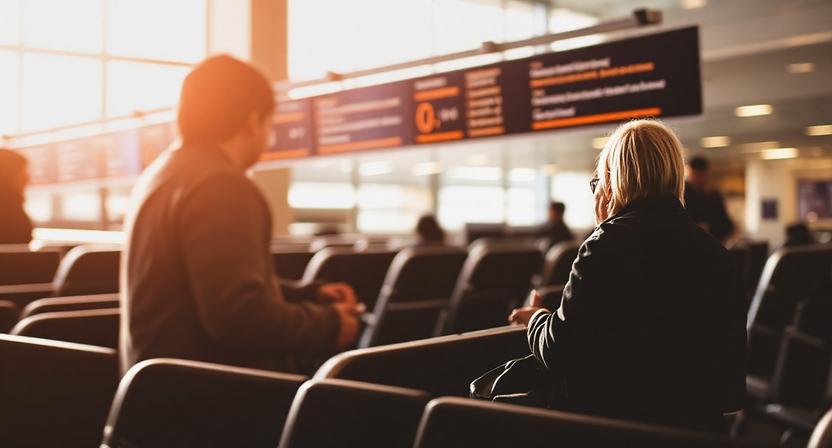Home » America Travel News » Thanksgiving Flight Plans in the United States Grow More Uncertain, InsureMyTrip Provides Five Key Tips for Travelers: You Need to Know
Published on
November 14, 2025
Although the nationwide shutdown has officially concluded, its aftershocks continue to disrupt air travel across the United States. Airports are still grappling with staffing shortages, reduced schedules, and operational backlogs that built up during the standstill. As a result, millions of Thanksgiving travelers remain vulnerable to unexpected delays, last-minute cancellations, and extended wait times during one of the busiest travel periods of the year.
With heightened uncertainty shaping the holiday rush, travelers are being urged to plan more strategically than ever. Experts at InsureMyTrip have outlined five essential tips designed to help passengers book smarter, stay flexible, and safeguard their holiday journeys as disruptions persist.
Smart Planning Becomes Crucial for Thanksgiving Flyers
Thanksgiving week traditionally brings crowded terminals and packed departure boards, but this year’s pressure is amplified by the lingering impact of staffing challenges. Airlines continue working to restore stability, yet reduced personnel and stretched resources mean that flight schedules may shift unexpectedly. In this environment, travelers who adopt proactive strategies stand a better chance of keeping their holiday plans intact.
Below are five key planning approaches recommended for navigating this turbulent travel period.
1. Book Early Flights and Steer Clear of Tight Connections
Scheduling an early-morning departure is one of the most effective ways to avoid cascading delays that build throughout the day. With fewer aircraft in rotation and staffing gaps still affecting operations, peak travel windows are experiencing higher cancellations and heavier congestion.
Nonstop flights remain the most reliable option, minimizing the risk of getting stranded between cities. For travelers who must book a connecting itinerary, a buffer of at least two hours is critical to help absorb delays at security checkpoints or during boarding.
2. Stay Informed and Prepare for Delays as a Routine Part of Travel
Even with the shutdown resolved, the aviation system needs time to recalibrate. Many airports continue to face bottlenecks as staff return, schedules normalize, and airlines work through backlogs.
Travelers are encouraged to monitor their flight status frequently using airline apps, travel alerts, or real-time tracking tools. Arriving early—far earlier than usual—can also help mitigate stress triggered by long security queues or unexpected gate changes. This mindset of expecting delays rather than being surprised by them will help passengers move through the system more smoothly.
3. Understand Your Passenger Rights Before You Fly
Knowledge is a powerful tool for travelers navigating unpredictable circumstances. When an airline cancels a flight or significantly modifies an itinerary, passengers are legally entitled to a full cash refund for the unused portion of their ticket, regardless of the reason for disruption.
Each carrier has unique policies regarding compensation for meals, hotels, and rebooking assistance. Because government-related staffing issues may affect what airlines are obligated to provide, travelers should carefully review their airline’s official policy before departure. Maintaining records, screenshots, and receipts will prove invaluable if reimbursement or insurance claims become necessary.
4. Prioritize Refundable and Flexible Travel Options
Flexibility has become a vital asset for holiday travelers. Many airlines, hotels, and car rental providers are offering more forgiving policies due to the ongoing uncertainty. Choosing refundable airfare or bookings that allow free modifications helps protect travelers from losing money should plans suddenly change.
These flexible options also make it easier to adjust itineraries if new disruptions arise, ensuring travelers remain in control even when conditions shift around them.
5. Strengthen Travel Protection With Comprehensive Insurance and CFAR
When refunds are limited or unavailable, travel insurance offers a critical safety net. A strong policy can cover unexpected complications such as severe weather, medical emergencies, lost luggage, or last-minute cancellations—issues that frequently escalate during the holiday peak.
For travelers seeking maximum freedom, upgrading to Cancel for Any Reason (CFAR) coverage provides additional reassurance. CFAR allows travelers to cancel for reasons outside standard policy terms, such as anxiety over continued disruptions or a simple change of heart. Depending on the plan, travelers can recover 50%–75% of non-refundable expenses, preventing major financial losses during an already stressful season.
A More Informed Approach to Thanksgiving Travel
Despite the official end of the shutdown, this Thanksgiving is shaping up to be more unpredictable than usual. Staffing challenges, operational slowdowns, and limited schedules require travelers to adapt, plan ahead, and protect their investments.
By choosing early flights, staying flexible, monitoring real-time updates, understanding passenger rights, and securing robust travel insurance with CFAR, travelers can navigate the holiday rush with confidence and reduce the impact of ongoing disruptions. This proactive approach not only safeguards holiday plans but also helps travelers enjoy a smoother, more manageable journey during a season when the skies are anything but predictable.

